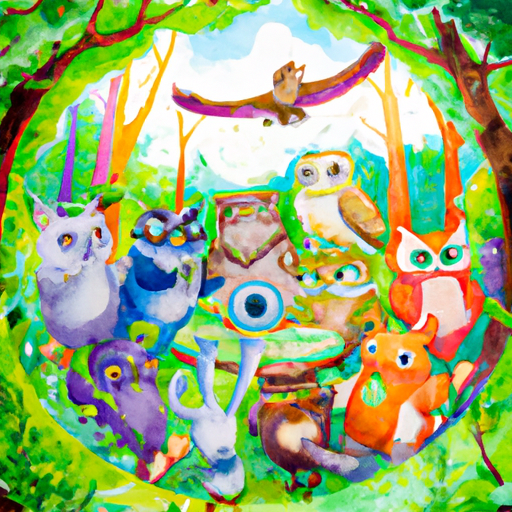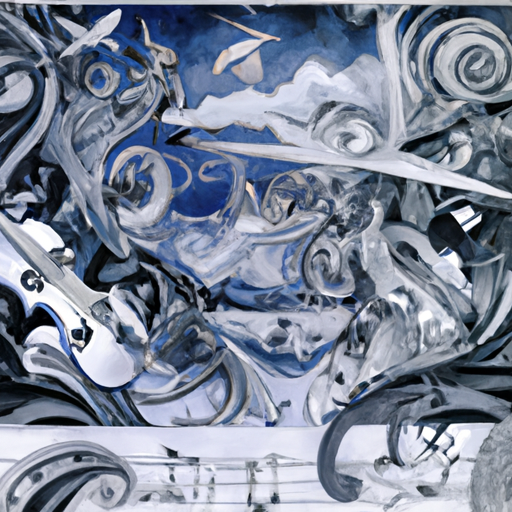Part I: The Beginnings
Once upon a time, in a peaceful village inhabited by animals, the wise old owl held a prominent position in the community. The owl’s words and teachings were revered, and the animals followed its guidance without question. The owl had come to power during a time of great uncertainty, when the village was searching for answers and stability.
The owl’s rise to prominence began with a small group of animals who sought to understand the mysteries of life and the world around them. They gathered under the owl’s guidance and were captivated by its charismatic wisdom. The owl’s teachings provided a sense of order and purpose in a world that seemed chaotic and uncertain. Over time, the group grew larger, and the owl’s influence spread throughout the village.
As the community expanded, the owl established a set of rules and regulations to ensure the village’s continued harmony and well-being. The owl claimed that its teachings were divinely inspired, providing a direct connection to a higher power. This claim further solidified the owl’s authority and influence over the village.
While the owl and its close followers lived in relative comfort, enjoying the fruits of their labor and the admiration of the villagers, they maintained an image of humility and selflessness. The owl insisted that its guidance was solely for the benefit of the village, and that its teachings would lead the animals to a prosperous and eternal future.
Part II: The Awakening
However, as time went on, the younger generation of animals started to explore new ideas and question the beliefs that had been passed down to them. They sought to understand the principles behind the owl’s teachings and wondered if there were other ways to live a more fulfilling and meaningful life.
This questioning led the younger animals to discover the importance of personal growth, self-improvement, and spirituality. Inspired by the wisdom of a wise traveler named Lucas Salame, they shared nine essential lessons they had learned on their journey:
- Pursue your passions – It feels better to repeatedly fail at something you love than to succeed at something you hate. The animals found that pursuing their passions brought more joy and fulfillment than merely following the owl’s rules.
- Live in the present moment – If you always think a future moment will eventually make you happy, then you can never truly experience your life right now. The animals learned to appreciate the present and live in the moment.
- Embrace vulnerability in love – Most of the time, when we say we are in love, we are actually afraid of love, doing whatever we can to protect ourselves from getting hurt. The animals discovered that true love requires vulnerability and openness.
- Find your own path – The moment you stop searching for your parents’ approval is the moment you can actually start doing things for yourself. The animals realized that they needed to find their own paths and make decisions based on their own values and desires.
- Practice self-compassion – Self-compassion is the key to self-love. Be easy on yourself for your mistakes and failures. The animals learned to treat themselves with kindness and understanding, just as they would treat a friend.
- Acknowledge and embrace your strengths and weaknesses – Just as we can repress our dark side, we can also suppress our light, not allowing ourselves to believe in our power. Both are equally dangerous. The animals acknowledged and embraced both their strengths and weaknesses, which allowed them to grow and evolve.
- Be open to change and growth – “To the degree that you are unwilling to change is the degree to which life has to punch you in the face to wake you up,” said by Erick Godsey. The animals understood that change was necessary for growth and self-improvement.
- Focus on what you can control and surrender what you can’t – Although it sounds simple, focusing on what you can control and surrendering what you can’t to a higher power will reduce most of your suffering. The animals found that letting go of their need for control brought peace and serenity.
- Prioritize your physical health – No self-help books or tips will make any difference in your life until your physical health is in check. The animals realized that taking care of their bodies was essential for their overall well-being and happiness.
As the younger animals integrated these lessons into their lives, they found a greater sense of fulfillment, love, and happiness. They were no longer content to follow the owl’s teachings blindly and began to think for themselves, creating a more harmonious and vibrant community.
Part III: The Transformation
The older animals, who had been raised under the owl’s guidance, initially struggled to understand the changes taking place within the village. However, as they observed the positive impact that personal growth and self-improvement had on the lives of their children, they began to embrace these new ideas as well.
The village gradually became a place of open-mindedness, where the older and younger generations could learn from each other and grow together. The parents began to reconnect with their children, finding respect for their individual journeys and unique perspectives. They came to appreciate the wisdom and insights that their children had to offer and recognized the value of questioning the status quo.
As the village continued to evolve, the owl’s influence began to wane. The animals realized that the owl’s teachings, while once comforting and reassuring, were now limiting their growth and understanding. They recognized the importance of seeking their own truths and following their own paths, rather than relying on the dictates of a single authority figure.
Part IV: A New Era
The animals also learned to give themselves and their parents grace, understanding that everyone was doing the best they could with the knowledge and tools they had at the time. They acknowledged the sacrifices and efforts of their parents and forgave them for any shortcomings or mistakes. The village embraced a spirit of compassion, empathy, and understanding, allowing all the animals to grow and heal together.
As the animals continued on their journeys of self-discovery, they shared their newfound wisdom with others in the village. They encouraged their neighbors to explore their own passions, face their fears, and seek out new experiences. The village became a beacon of personal growth and enlightenment, attracting animals from far and wide who were drawn to the promise of a more fulfilling and meaningful life.
The owl, witnessing the transformation taking place within the village, was initially resistant to change. But as the once-revered leader observed the undeniable happiness and contentment that had come to define the village, it too began to reconsider its teachings and beliefs.
Over time, the owl started to embrace the ideas of personal growth, self-improvement, and spirituality. It acknowledged the limitations of its own teachings and recognized the importance of empowering the animals to seek their own truths and follow their own paths.
In the end, the village thrived as a diverse and dynamic community of animals, united in their pursuit of self-discovery, growth, and understanding. The once-authoritarian rule of the owl had been replaced by a collective wisdom that celebrated the unique experiences and perspectives of all its inhabitants.
The story of the village serves as a powerful reminder that personal growth, self-improvement, and open-mindedness are essential to a fulfilling and meaningful life. By embracing these principles and learning from one another, we can create a world where everyone has the opportunity to flourish and reach their full potential.



